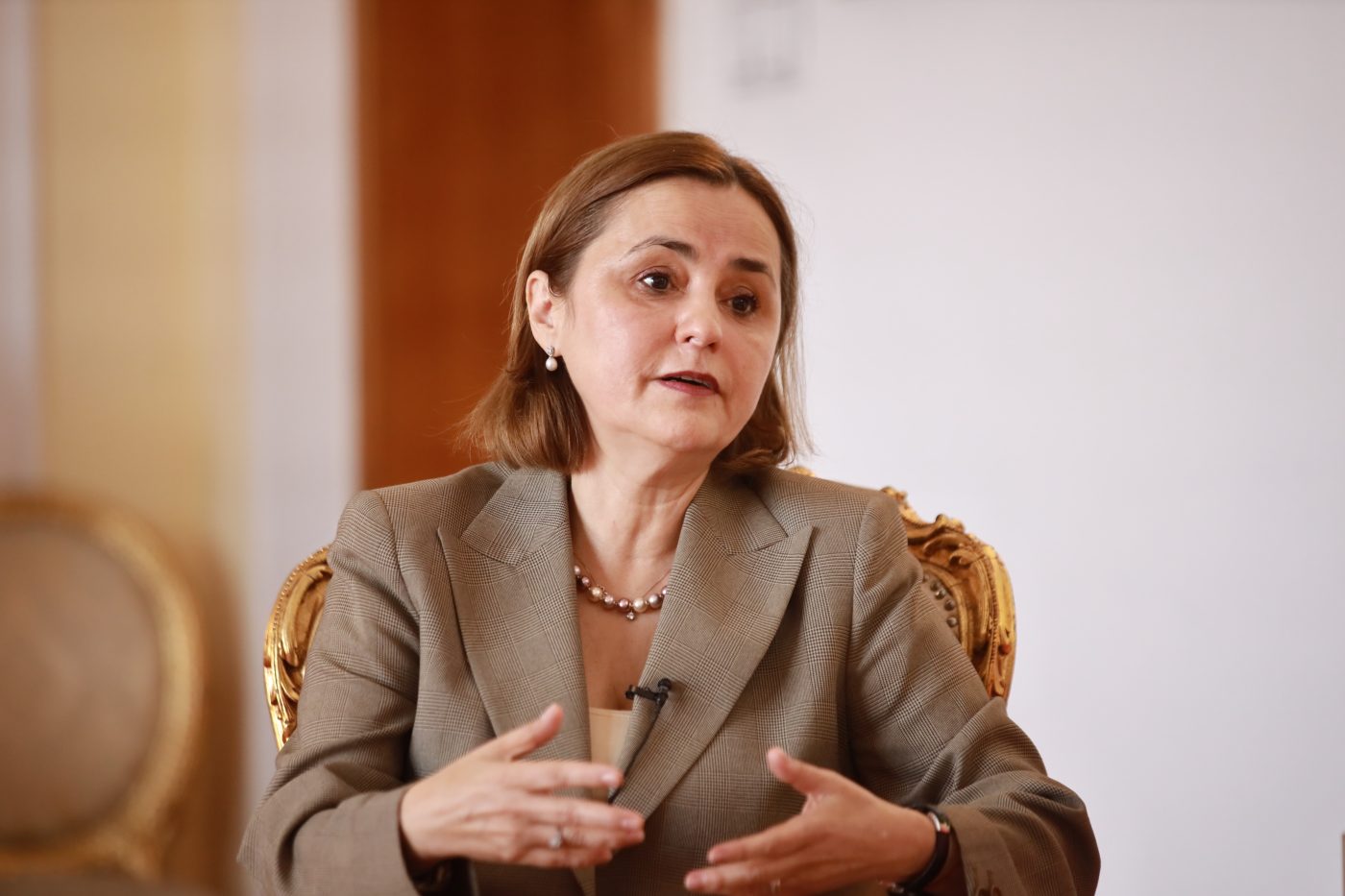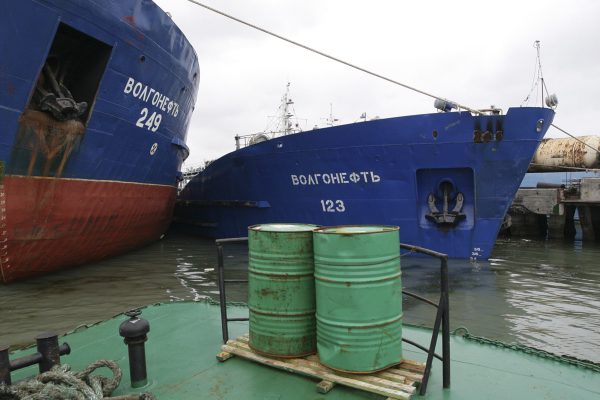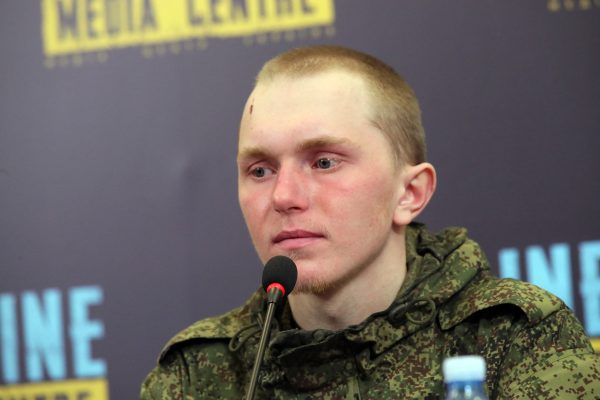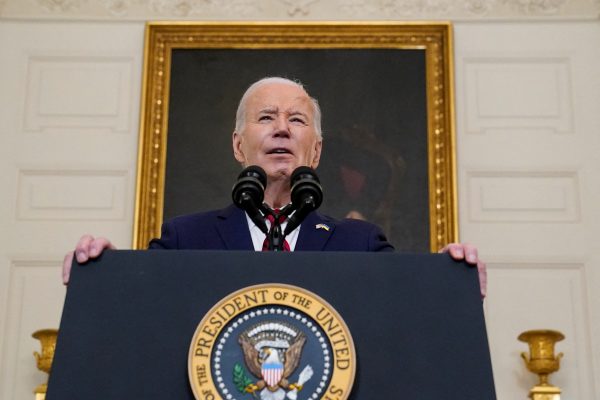Tania Latici: Welcome, everyone to the 2023 edition of the CEPA Forum, Winning the War, Winning the Peace. My name is Tania Latici and I have the great honor to moderate today’s conversation. I work in the EU’s diplomatic service where I deal with peace, security, and defense issues. And when I don’t do that, I’m very happy to call myself a fellow with CEPA’s Transatlantic Defense and Security Initiative. Now I am today in Bucharest in the beautiful Ministry of Foreign Affairs of Romania. And I’m very happy to be seated next to the top boss, Romanian Minister of Foreign Affairs Luminița Odobescu. Now, I have the challenging task of introducing the minister who has had a career and continues of course, to have a career that diplomats barely dare to dream of, I actually had the pleasure of meeting the minister in 2018, as she was preparing to take the helm of the EU.
In Romania’s first presidency of the EU Council, she held the role of Romania’s ambassador to the EU, which she held for six years or so. So obviously, she knows the EU inside and out, and not only because of that, but also because she played key roles in Romania’s EU integration and then Romania’s EU accession. Next to that, of course, she was a diplomatic adviser to the Romanian president. And as if that’s not enough, she is also a PhD and she has two knighthoods, which were offered to her by France and Romania for her outstanding service. So moving to my first question, I would like to ask you as diplomatic adviser to the Romanian president, you’ve obviously witnessed Russia’s brutal invasion of Ukraine, from the diplomatic frontlines in all the stages of the war. So I wanted to ask, looking back, how would you characterize the current phase of the war that we are witnessing?
H.E. Luminița Odobescu: First of all, welcome to Bucharest and to the Romanian foreign ministry. I think for everyone, that day in February was a shock. And we have to recall that at the beginning of the war, the Russian leadership believed that Ukraine would fall in a few days. They were wrong. And Ukraine and Ukrainian people have shown enormous courage, determination, and resilience. What is important now is to continue our strong support for Ukraine, and for Ukrainian people. Because they are defending their territory, they are fighting for peace, for restoring the sovereign unity and territorial integrity. Russia started an illegal, brutal, and unjustified war against Ukraine.
We are the neighbor of Ukraine and our commitment, strong commitment is to support Ukraine as long as it takes. It is important to continue our strong support to Ukraine, both bilaterally, but also within the EU and NATO, as Ukraine has started, step by step to take back the territories illegally occupied by Russia. The security situation in our region is deteriorating. The Black Sea region is very important, it is of geostrategic importance, because we don’t speak only about Ukraine, but also we speak about the vulnerable partners like the Republic of Moldova and Georgia, and what Russia is doing recently in our region is outrageous.
Latici: Absolutely. You spoke about the fact that we need to support Ukraine for as long as it takes and as much as it takes. So now the international community is very focused on the various security commitments that were made by the EU. There was the G7 declaration, NATO allies are involved as well. So how do you see these commitments being taken forward in the future?
Odobescu: Romania believes that President Zelenskyy’s peace formula is the right proposal for a just and long lasting peace and Romania strongly supports the President Zelenskyy peace formula and is involved in the current discussions. I think the starting point of any negotiation is that any peace should be with Ukraine, for Ukraine. Ukraine alone decides when, if, in what terms, to discuss the peace. This is very important to underline and this is a position strongly supported by Romania. As I said, we have joined the G7 statement on the security commandments, we are participating in the discussions on the peace formula. We have attended the meeting in [jaddaf]. Very important meeting, because practically, we have started the discussions from the UN charters. And also, we appreciated the high level participation of a lot of countries all around the world. It is important to continue the discussions.
We are committed, and we are also part of the joint outreach efforts in discussing and presenting the security situation at our borders in Ukraine, what Russia is doing in Ukraine, and in our regions to all our partners. Romanian President paid a visit at the beginning of the year in Latin America, in several countries, where he discussed with the leaders about the security situation and what Russia is doing. We will continue these outreach efforts, joining other EU member states in this effort. It is also our responsibility at the level of the foreign ministry to present the situation, to discuss with all our partners, because we are discussing about a serious security situation in the Black Sea region.
Latici: Absolutely. And of course, this is the theme of this year’s CEPA Forum Winning the War, Winning the Peace, on Ukraine’s terms exactly as you emphasized it. Looking more on the security side of things because they go of course, hand in hand, how do you see Romania’s role and voice in the EU, but also in NATO communities? But I’m mentioning the EU because the statements that we’ve seen say that the ultimate security guarantee that Europeans can offer to Ukraine is EU membership. So how do you see this debate moving forward and then Romania’s voice and influence in this debate?
Odobescu: Well, I think Romania plays an important role in all the discussions, both in the EU and in NATO. Why? Because it’s about our region, it’s about our security in the Black Sea region. And in the last year, we raised the issue of the geostrategic importance of the Black Sea, both in the EU and in NATO. The role and importance of the Black Sea region was raised at the NATO Summit in Madrid and in Vilnius, and this was recognized in the Vilnius NATO Summit Communique, where we have a full paragraph on the role of and the importance of the Black Sea region. But the question now is how do we turn these words into reality? As I said, the security situation in our region has deteriorated. And we have seen the recent attacks of Russia on the Ukrainian ports, on the Danube very close, hundreds of meters, away from the Romanian border.
We have also seen all the threats of Russia to the commercial navigation in the Black Sea. Most recently, we have seen the way this war affected directly Romania. We have recently identified on our territory parts of Russian drones, similar to those used by Russia in the war against Ukraine. This is very serious because it’s also a violation of our airspace. All these attacks are very close to the Romanian borders, on the civilian infrastructure, on the innocent people. [The attacks] were strongly condemned by the president, by the government of Romania, and they also pose a risk for our citizens because these incidents happen very close to the Romanian-Ukrainian border.
We have a summon to the Foreign Ministry, the head of Russian Mission to Bucharest to send our strong protest against the violation of the Romanian airspace. And this is really serious and we are discussing now about the Black Sea regions. Of course, as I said, what we can do more to turn these words into reality; I think we have started already because the posture of defense and deterrence is strengthened. Ssince the beginning of the war in Romania it was established a battle group led by France with the contribution of other important partners like Netherlands, Luxembourg, Belgium. Also, the US military presence has tripled since the war started. We are speaking about more than 3000 US troops on the Romanian territory. Following the deterioration of the situation close to our borders, NATO increased its presence in participating in air policing, air patrolling commissions, of course, together with the Romanian forces, and our US partners will send us additional F-16 planes.
Latici: Absolutely, you anticipated my question. Obviously, the Black Sea is not just any sea; its geopolitical and strategic importance has risen and with this Romania’s responsibility as a regional actor in ensuring Black Sea security has risen as well. I think the EU and NATO both have to think of creative solutions.
The Black Sea also has an interesting and delicate, I would say, diplomatic and then military weight to it as well. So thank you for that. Maybe I can ask you now about the rumors and all sorts of narratives that are pushed by Russia-friendly outlets and so on that, you know, the Western support to Ukraine is going to weaken and that it has a time limit and so on. What would you say to those negative narratives?
Odobescu: I don’t think so. It’s not the case. Romania will continue to support Ukraine as long as it takes. And all the member states, all the NATO allies will continue to support Ukraine for as long as it takes. It is important to restore its territorial integrity, and our support is strong. From the first day of the war, Romania played a pivotal role in the support to Ukraine. I will start with the refugees. More than 5.8 million Ukrainian refugees across the borders of our country. They were warmly welcomed by the population. And those who decided to stay in Romania benefit from free access to social services, medical care, education for the children. So this support definitely will continue. But it’s not only about this support for the Ukrainian refugees. We set up in Suceava a humanitarian hub, where we coordinated the international humanitarian assistance for Ukraine and I think it’s more than 100 convoys of trucks of humanitarian aid that crossed Romania.
Then, what we are doing these days: we focus very much to support Ukraine in transiting the cereals to the countries in need in the North of Africa or other regions. As we speak, we have a meeting with our Ukrainian colleagues and colleagues from the Republic of Moldova to see how we can increase the transit capacity for the export of Ukrainian cereals. What Romania has done is quite important because we are speaking about more than 25 million stones of Ukrainian cereals, transiting Romania, which is more than half of the whole exports of Ukrainian cereals through the solidarity lanes put in place by the European Union to support Ukraine. In the military field, we have set up a hub for the training of the F-16 pilots, including for the training of Ukrainian pilots. So I think there are a lot of important messages for those saying that we are tired of supporting Ukraine. We are not. So this is very clear. This is a very clear message, not only from Romania, but from all our partners. Ukraine should and must be helped, must be supported. It is really important because they are defending us. They are not only defending their country, they are also defending us, our security, our freedom, because what Russia is doing with this illegal, brutal, unjustified war, risks threatening others. So I think this is our clear voice to those who say something else.
Latici: Absolutely. What I hear from you is solidarity across the board: solidarity on the humanitarian side, on the security side, on the military side, and on the diplomatic side.
Odobescu: And also in the EU, because now we discuss within the EU, to open the negotiations for accession for Ukraine, and the Republic of Moldova. So our support is both in the EU, in the negotiation, and also within NATO.
Latici: Absolutely. So it’s very clear that Romania has the solidarity, the transatlantic community has the solidarity, but as in this forum, we are addressing a truly international crowd. What is your view about how we continue to build the world, the global solidarity with Ukraine, you mentioned the peace formula, but how do we make sure that Ukraine wins the peace as it wants? What more can we do to get the world on board?
Odobescu: I think what is really important is to continue our dialogue with all our partners and actors all around the globe. It’s important to explain what’s happened in Ukraine, at our borders, in our regions, what Russia is doing, why it is illegal, why it is unjustified, why it is brutal. We are speaking about innocent people. What were the reasons to start the war in Ukraine? Besides the entire imperialistic vision of Russia, why? So we have to continue explaining this to our partners, to all the actors around the globe. And Romania is very much involved in this process together with other partners from the EU to continue the dialogue and to explain, as I said, and to present our position, because our position is also based on observing the UN charters, on observing the basic principles and values. So at the level of the Romanian president and the level of the government and the level of the ministry, we will continue our dialogue, and our work in discussing and explaining with all our partners; this is a top priority in all our meetings with different partners. Not only about [what] Romania or the EU or NATO, are doing for Ukraine, but explaining our views, our vision about the current situation, and about the peace as well. And explaining how the President Zelenskyy’s peace formula is so important.
Latici: Minister Odobescu I would love to ask you a million more questions, but I’m afraid we have to conclude here. Thank you so much for the generosity of your time, of your insights. I think you passed a very strong message that Romania stands with Ukraine, the EU stands with Ukraine, NATO stands with Ukraine, and hopefully, the whole world will stand with Ukraine, thanks to your diplomatic efforts. So thank you very much. Thank you also very much to everyone for tuning in to the 2023 CEPA Forum, Winning the War, Winning the Peace. Do check out cepa.org for the entire agenda for all the speakers, for all the sessions, and do check CEPA out on all social media you can name to stay in tune #CEPAForum to tell us what you think. So thank you very much, from me, Slava Ukraini, and “La revedere” from Bucharest.
Odobescu: Thank you very much, la revedere.
Europe’s Edge is CEPA’s online journal covering critical topics on the foreign policy docket across Europe and North America. All opinions are those of the author and do not necessarily represent the position or views of the institutions they represent or the Center for European Policy Analysis.






